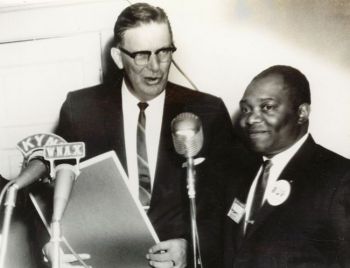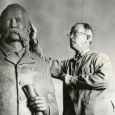The Gift of South Dakota
Subscriptions to South Dakota Magazine make great gifts!
Subscribe today — 1 year (6 issues) is just $29!
Yankton's Civil Rights Champion
Feb 21, 2019
Until the day Ted Blakey died in 2004, he possessed a newspaper clipping from February 1838. It advertised his grandfather, an 11-year-old boy at the time, for sale at a slave auction in Missouri. For Blakey, a Yankton businessman and tireless Civil Rights advocate, it served as a reminder of how far his family had come.
Blakey was born in Yankton in 1925, the youngest of 11 children. His family roots were in Missouri, but his father and uncle were encouraged to move to South Dakota after hearing Tom Douglas, an African-American who ran a successful business in Yankton. Douglas wanted to share the freedom he enjoyed so in 1904 he traveled through Missouri, telling everyone who would listen that if they came to Yankton they would find “freedom like you’ve never seen anywhere.”
Blakey’s father and uncle were in the crowd one day and were intrigued by the proposal. The final straw came the day his father was accused of assaulting a white woman after simply bumping into her in a dry goods store. The clerk threatened to lynch him if he ever returned. When he got home he told his wife they were leaving for South Dakota. They arrived in Yankton on Oct. 16, 1905.
In the Dakotas African-Americans did not find the same attitudes toward them that were prevalent in Southern states, but discriminatory language still found its way into early territorial laws. Gov. William Jayne, in his first message to the new territorial legislature in 1862, called for a ban on slavery. Despite his entreaty, a committee passed a bill preventing “persons of color” residing in Dakota Territory. Fortunately the full House rejected the measure. Still, the Organic Act that authorized a government for Dakota Territory declared that only “every free white male inhabitant of the United States…shall be entitled to vote at the first election.” Not until 1868 did the legislature delete the word “white.” Similarly, schools were “equally free and accessible to all white children,” until 1868.
Blakey became the owner of a successful janitorial service and pest control business in Yankton. He was also president of the school board and the PTA and active in the Jaycees and Kiwanis. “It was never really that bad,” Blakey recalled in a 2001 interview, though there were incidents of discrimination in the 1960s. South Dakota’s chapter of the National Association for the Advancement of Colored People surveyed the state and found certain restaurants in Sioux Falls, Rapid City, Huron, Mitchell and other larger towns refused to allow blacks to eat in. Another survey by the Black Hills Civil Rights Committee revealed that 90 percent of bars and barbershops and 30 percent of restaurants and motels in Rapid City refused service to blacks.
The NAACP and Gov. Archie Gubbrud recruited Blakey to remedy the situation. “That was when I really hit it,” he later recalled. “I went before Rotary, Kiwanis, the Sacred Heart PTA and a lot of clubs there. See up until then, a black person couldn’t get a haircut in Yankton until after 5 o’clock. He (the barber) pulled down the shade and cut your hair. There was not a barbershop in Yankton that would cut a black man’s hair in 1963.”
Blakey helped change all of that. In 1963 Gov. Gubbrud signed a Civil Rights Bill. Blakey also urged the state legislature to approve the 24th amendment to the constitution, eliminating the poll tax. South Dakota was the 38th and final state needed to approve the amendment in 1964.
In time Blakey came to be the unofficial spokesperson for South Dakota’s black population, a role he especially relished whenever outsiders had questions. “We hear about the Holocaust, and survivors of Pearl Harbor,” Blakey says. “I want them to know what black people did in South Dakota, and in Yankton.”
Thanks to Ted Blakey, many South Dakotans knew the story well.











Comments
The work he did for civil rights will live on.
I am proud to have known him and to have had him in my life.
It was before my time but I have it on good authority that as young man Ted was the only guy in Yankton with enough style to wear a Zoot suit at the local dances.
A decade after his passing and he still makes people smile.That's a real legacy.